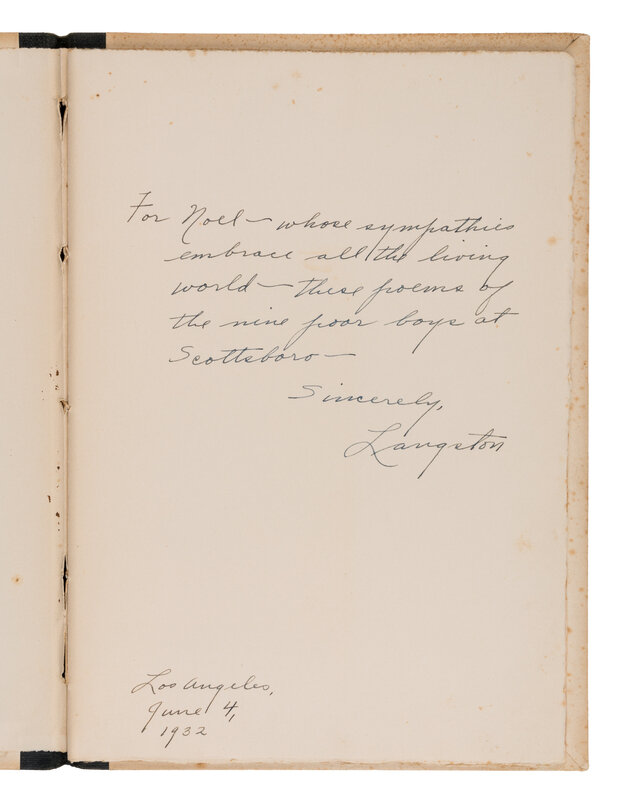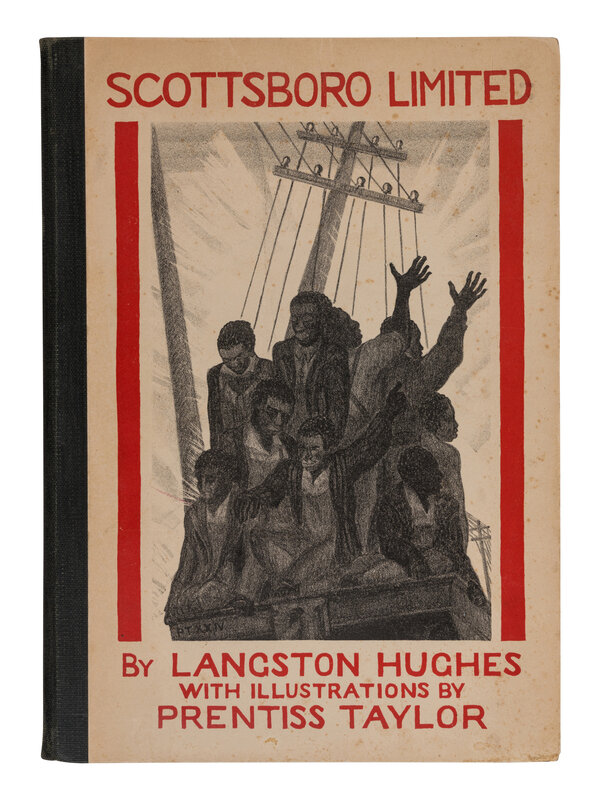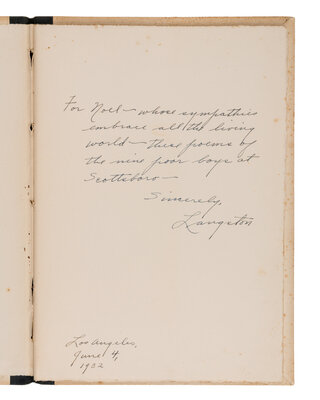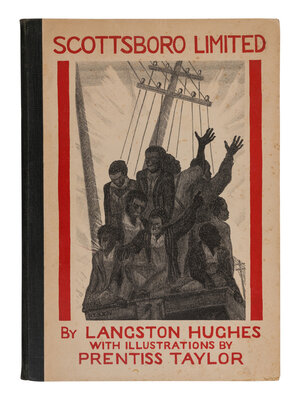Lot 217
HUGHES, Langston. Scottsboro Limited. Prentiss Taylor, illustrator. 1932. FIRST EDITION, LIMITED ISSUE. INSCRIBED BY HUGHES TO NOEL SULLIVAN.
Sale 1336 - Fine Books and Manuscripts, including Worlds of Tomorrow, and Americana
Jun 7, 2024
9:00AM CT
Live / Chicago
Own a similar item?
Estimate
$6,000 -
8,000
Price Realized
$10,795
Sold prices are inclusive of Buyer’s Premium
Lot Description
HUGHES, Langston (1901-1967). Scottsboro Limited. Prentiss Taylor, illustrator. New York: The Golden Stair Press, 1932.
4to. 4 lithographs by Prentiss Taylor tipped to larger sheets. (A few mostly marginal spots.) Original black cloth-backed pictorial boards, uncut (hinges just starting, spotting). Provenance: Noël Sullivan (presentation inscription, bookplate); by descent to present owner.
FIRST EDITION, LIMITED ISSUE, number 1 of 30 large-paper copies printed on Papier de Rives, signed by Hughes and Taylor.
PRESENTATION COPY, INSCRIBED BY HUGHES TO SULLIVAN: “For Noel – whose sympathies embrace all the living world – these poems of the nine poor boys at Scottsboro – Sincerely, Langston. Los Angeles, June 4, 1932.”
In March 1932, Noël Sullivan wrote to Langston Hughes to invite him to stay with him in San Francisco. In that letter, Sullivan shared that he had just sung a Hughes poem set to music by John Alden Carpenter in a concert, and had long been an admirer of Hughes’s poetry. Sullivan once confessed: “’Deep down in my heart, though grateful for the many unsought blessings that have come to me, I have always been ashamed of privilege.’ In response, he generously supported a wide range of liberal causes, from the protection of animals to the abolition of the death penalty. He employed blacks in his home…[but also], to the astonishment of many people, not least of all blacks, Sullivan also treated some Negroes as social equals” (Rampersad, The Life of Langston Hughes, Vol. I, p.239). By the conclusion of Hughes’s stay with Sullivan in mid-May 1932, the two had developed a very close relationship. “Hughes’s immediate impact on Noël Sullivan was…dramatic” (ibid., p.239).
In February of 1933, upon hearing the news that the Scottsboro Boys were scheduled to face new trials, Hughes wanted to do something to raise money for their legal fees. He appealed to writers and artists, including Eugene O’Neill, Carl Van Vechten, Countee Cullen, Paul Green, Edna Ferber, Julia Peterkin, John Dos Passos, Ezra Pound, George Bernard Shaw, Bertrand Russell and Anita Loos to contribute books, manuscripts, pictures and other gifts to be included in an auction for the cause. “Noël Sullivan, who gave a tea for a visiting Scottsboro mother, Mrs. Janie Patterson, offered the use of his Hyde Street Mansion [for the sale]…. A preview at Noël Sullivan’s home drew a large crowd to Russian Hill to inspect the items and mansion” (ibid., pp.283-4). The sale raised $1,400.
Hughes presented Sullivan with several books throughout the course of his stays in San Francisco and Carmel-by-the-Sea in the spring of 1932 (see lots 215 & 216), but perhaps none of these gifts were more significant than this copy of The Scottsboro Boys. Originally planned in an edition of 100, only 30 copies were produced; Hughes presented Sullivan with copy number 1 of the work. “In the fall of 1931, the driving public force in Hughes’s move to the left was certainly the Scottsboro controversy” (ibid., p.216). Hughes would write lithographer Prentiss Taylor: “’I’m more excited about this Scottsboro booklet than anything I’ve ever had published’” (ibid., p.235).
A SUPERB ASSOCIATION COPY OF THIS SCARCE WORK.
Fine African Americana from the Collections of Noël Sullivan & William P. and Alice D. Mahoney
Condition Report
Contact Information
Auction Specialist



